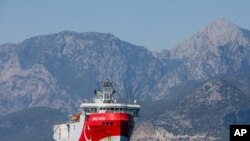Greece's entire armed forces are on emergency alert Monday following Turkey's decision to send a vessel to explore potential drilling sites off the coast of two Greek islands in the southeast Aegean Sea. The escalation comes after Greece and Egypt signed a maritime deal blocking Turkish access to the Eastern Mediterranean — a move that has enraged Turkish President Recep Tayyip Erdogan, leading him to flex his country's muscle in a long-running territorial tussle.
Defense ministry officials denied that reservists had been called up overnight as a result of the brewing crisis.
Still, the same sources tell VOA that Greece's entire military apparatus is on red alert, monitoring Turkey's movements after the neighboring state launched naval drills east and south of the islands of Rhodes and Kastellorizo in the southeast Aegean Sea over the weekend.
The drills include live fire, and most worrying for Greece, Ankara on Monday also sent out the vessel Oruc Reis to survey the continental shelf in an area in the Eastern Mediterranean, which both Greece and Turkey consider their own.
While both NATO allies, the two neighboring countries have been challenging each other's air and sea rights in the region for decades.
The two countries came to the brink of war more than 20 years ago. Just last month, German Chancellor Angela Merkel weighed in on a fresh territorial tussle between the two, convincing Erdogan to back off from sending the Oruc Reis on a similar expedition in the same region.
Both sides agreed to a moratorium, promising to refrain from any hostile action until sitting down at a negotiating table later this month to try and sort out differences.
But in the past week, Greece has angered Turkey with what Ankara has billed a breach of the moratorium — a maritime agreement that Athens secretly clinched with Egypt, limiting Ankara's influence and energy designs in the region.
As a result, Erdogan ordered out the Oruc Reis, sending it on its initial expedition escorted by Turkish battleships, which Ankara has said it will use if Greece makes any attempt to block the vessel from its course.
On Monday, Prime Minister Kyriakos Mitsotakis chaired an urgent meeting of his national security council. A terse announcement issued after the hourlong meeting said officials had assessed the situation and reviewed Greece's response to any Turkish provocation, as they put it.
Since then, Mitsotakis has also briefed leading European officials, and he is due to speak to the Secretary-General of NATO, insisting, as his advisers tell VOA, that the U.S.-led military alliance weigh in against Turkey.
Foreign Minister Nikos Dendias, meantime, says Greece remains ready to sit down and talk with Turkey.
"We understand that Turkey has called off the talks. But I am surprised it has done so," Dendias said. "Maybe it is the result of some inexplicable rage. We can only hope it comes back to its senses."
The stakes are high, and Greece has warned it will use force to block any Turkish encroachment of its sea and land rights.
Experts like Costantinos Filis expect the crisis to escalate before it eases to any show of rapprochement.
"I expect the tension to grow in the coming days. But ultimately, the fate of the feeble Turkish economy will weigh in on any final decision Erdogan will take," Filis said.
If Erdogan feels Europeans are serious about their threats to retaliate, then he will probably think twice about making any risky moves. Then again, Filis says, Erdogan is extremely unpredictable, and if he feels he is cornered, he may ultimately go for a daring move to cater to his domestic audience alone.
EU leaders already have threatened Turkey with economic sanctions.






